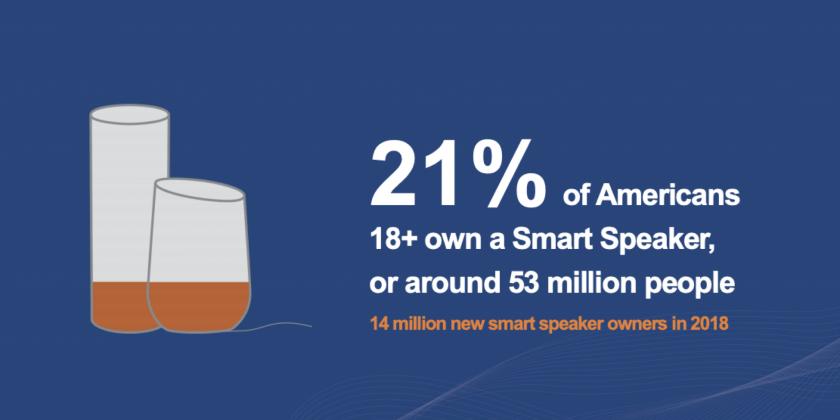
NPR And Edison Research Release The Smart Audio Report Spring 2019
This article is at least a year old
Washington DC, USA—New research in The Smart Audio Report series reveals how smart speaker user behavior and perceptions are evolving as owners ‘settle in’ with their devices and the market matures out of its introductory phase. According to the Spring 2019 survey, seven-in-ten smart speaker owners use their device daily despite common concerns around security and privacy, while those same factors are leading reasons non-owners have not acquired a device. The Smart Audio Report Spring 2019, part of the industry’s longest-running public research series about smart speaker consumer behavior in the U.S., is available now at npr.org/smartaudio.
“We are starting to see more pragmatic usage of these devices,” said Tom Webster, SVP of Edison Research. “The longer people have these devices, the less experimentation they do with them — but the more ingrained into everyday life these devices become.”
Among the 53M+ smart speaker owners A18+ in the U.S.:
● 69% of smart speaker owners use their device daily, and households with children are even more likely to use them daily
● Smart speaker owners who have owned the device for 2+ years use an average seven (7) skills per week, compared to an average 12 skills per week among those who have owned the device for less than three (3) months
● 66% of those who own a smart speaker with a screen say the screen has made it easier to discover new content, and the same number say having a screen makes the smart speaker “easier to use”
“We continue to see those that have voice assistant devices love them, using them every day to get the news, listen to podcasts, live stream radio stations and more,” said Joel Sucherman, NPR Vice President, New Platform Partnerships. “The latest data suggest we’ve moved into a maturation phase in this space, in which earning and maintaining the trust of potential smart speaker buyers, while also demonstrating new functionality, may be a key to continuing dynamic growth,”
While almost half of smart speaker owners are planning to acquire another device, the Report also finds a slowing interest among non-owners in acquiring their first smart speaker. Among people who do not own a smart speaker and are interested in acquiring one, the top two reasons they have not are:
- 63% are concerned that hackers could use a smart speaker to gain access to their home or personal information
- 55% are bothered that smart speakers are always listening
Security remains a concern around these devices among current users as well. Almost 60% of smart speaker owners worry about hackers, and more than half indicated it bothers them that their smart speaker is always listening.
The Smart Audio Report from NPR and Edison Research, which debuted in June 2017, is a recurring study on trends in Smart Speaker ownership and voice assistant user behavior. A full archive of research from the Report is available at www.npr.org/smartaudio. NPR was the featured Flash Briefing provider on Amazon Alexa devices at launch in 2014, and also on Google Assistant, Microsoft Cortana, Samsung Bixby and Apple Siri devices.
How This Study Was Conducted
The Smart Audio Report Spring 2019 is based upon a national online survey of 1,641 Americans ages 18+, 812 who indicated that they owned at least one Smart Speaker and 829 who indicated they did not own a smart speaker. The device owner data was weighted to nationally representative figures on Smart Speaker users from The Infinite Dial 2019 from Edison Research and Triton Digital.
About NPR
NPR’s rigorous reporting and unsurpassed storytelling connect with millions of Americans every day — on the air, online, and in person. NPR strives to create a more informed public — one challenged and invigorated by a deeper understanding and appreciation of events, ideas, and cultures. With a nationwide network of award-winning journalists and 17 international bureaus, NPR and its Member Stations are never far from where a story is unfolding. Listeners can find NPR by tuning in to their local Member stations (npr.org/stations), and now it’s easy to listen to our stories on smart speaker devices. Ask your smart speaker to, “Play NPR,” and you’ll be tuned into your local Member station’s live stream. Your speaker can also access NPR podcasts, NPR One, NPR News Now, and the Visual Newscast is available for screened speakers. Get more information at npr.org/about and by following NPR Extra on Facebook,Twitter and Instagram.
About Edison Research Edison Research conducts survey research and provides strategic information to a broad array of clients, including Activision, AMC Theatres, Disney, Dolby Laboratories, Google, Oracle, the U.S. International Broadcasting Bureau, Pandora, Samsung, Siemens, Sony, The Gates Foundation, and Univision. Edison is the leading podcast research company in the world and has conducted research on the medium for NPR, Slate, ESPN, PodcastOne, WNYC Studios, and many more companies in the space. Another specialty for Edison is its work for media companies throughout the world, conducting research in North America, South America, Africa, Asia, Australia, and Europe. Edison is also the leading provider of consumer exit polling and has conducted face-to-face research in almost every imaginable venue. Since 2004, Edison Research has been the sole provider of Election Day data to the National Election Pool, conducting exit polls and collecting precinct vote returns to project and analyze results for every major presidential primary and general election.
This is a press release which we link to from Podnews, our daily newsletter about podcasting and on-demand. We may make small edits for editorial reasons.